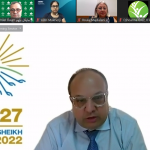تم تصميم برنامج فرصة، الذي أطلقته وزارة التضامن الاجتماعي في مصر عام 2021، كبرنامج تخرج من الفقر يستهدف المستفيدين الحاليين من برنامج تكافل للتحويلات النقدية. ولفهم مدى جدوى دعم برنامج فرصة للأسر في توليد الدخل، وتكوين فكرة أفضل عن سمات الأسر المستفيدة التي قد ترتبط بنجاح البرنامج، يقوم المعهد الدولي لبحوث السياسات الغذائية بالتعاون مع وزارة التضامن الاجتماعي بإجراء تجربة موجهة تستخدم عينات عشوائية من برنامج فرصة التجريبي (انظر مذكرة السياسة رقم 21 للبرنامج الإقليمي للمعهد الدولي لبحوث السياسات الغذائية لمنطقة الشرق الأوسط وشمال إفريقيا لمزيد من التفاصيل حول تصميم البرنامج وتقييمه).
NEW PUBLICATION: Forsa Pilot Evaluation Baseline Survey Results
The Forsa program, launched in 2021 by the Egyptian Ministry of Social Solidarity has been designed as a graduation program targeted to current beneficiaries of the Takaful cash transfer program. To understand how well Forsa supports household income generation and to better understand the beneficiary household characteristics which may relate to program success, the International Food Policy Research Institute in collaboration with the Ministry of Social Solidarity is running a randomized control trial of the pilot Forsa program..
NEW PUBLICATION | Impact evaluation report: Egypt’s Forsa graduation program
Forsa, which means “Opportunity” in Arabic, is a new economic inclusion program of the government of the Arab Republic of Egypt. Implemented by the Ministry of Social Solidarity, the program aims to graduate beneficiaries of the national cash transfer program, the Takaful & Karama Program (TKP), to economic self-reliance by enabling them to engage in wage employment or sustainable economic enterprises..
CGIAR consultation workshop with innovation ecosystem in Uzbekistan for sustainable agriculture and climate action
Since 2016, the Government of Uzbekistan has shown strong political commitment towards the innovative development of the country by implementing strategies and support mechanisms to nurture an innovation culture.
CGIAR Borlaug Dialogue 2022 side event: Egypt’s COP27 plans and the role of CGIAR
On Thursday, October 20, 2022, The International Food Policy Research Institute (IFPRI), The International Center for Agriculture Research in the Dry Areas (ICARDA), and CGIAR’s Initiative: National Policies and Strategies (NPS) jointly organized a Pre-COP27 seminar: Accelerated Action for Food Systems Resilience: Egypt’s Plans for Cop27 and The Role Of CGIAR. The virtual seminar was also live-streamed as Borlaug Dialogue side event. This event was inspired by Egypt's Presidency of COP27 and hence the main objective of the event was to highlight Egypt’s priorities for COP27. The event also covered discussions specific to Egypt’s agri-food sector as well as CGIAR’s research portfolio and plans for COP27. The event brought together representatives from Egypt's Presidency of COP27 and several senior leaders and climate scientists from CGIAR.
- « Previous Page
- 1
- …
- 6
- 7
- 8
- 9
- 10
- …
- 39
- Next Page »




